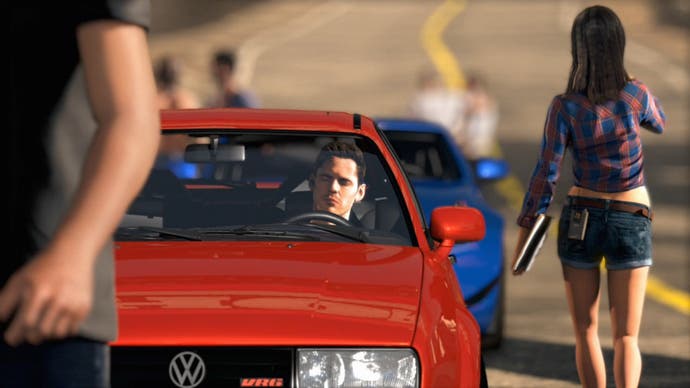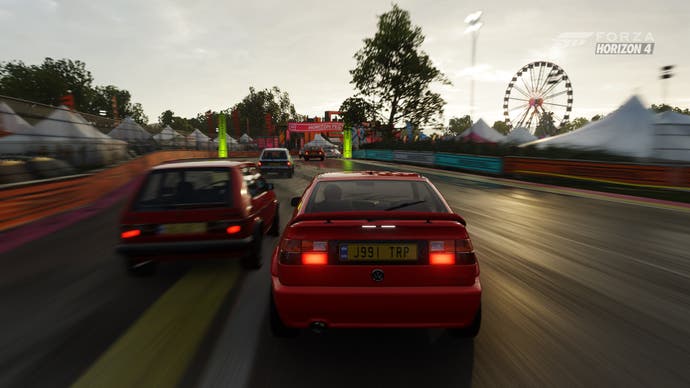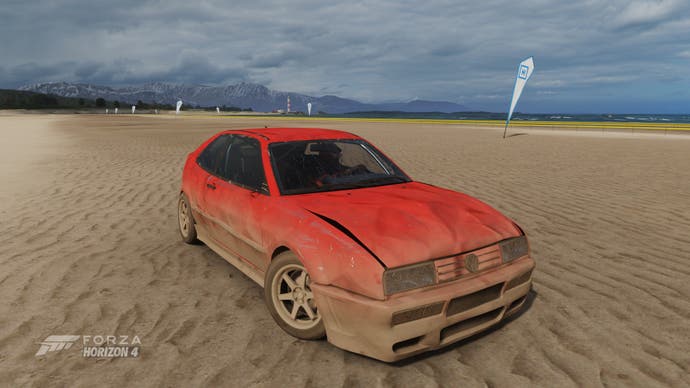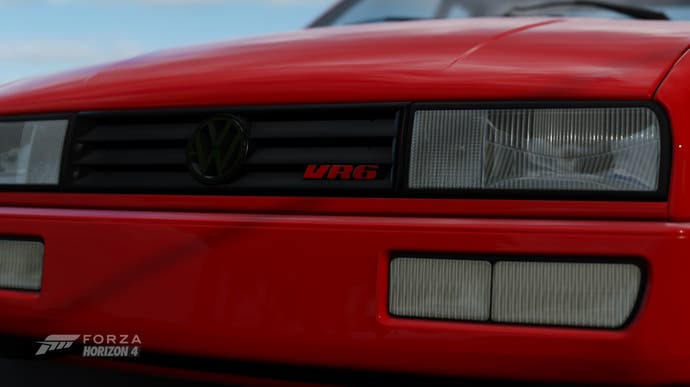Forza Horizon 4's latest weekly challenge is a reminder of everything the first game did right
In living Colorado.
Every week, Forza Horizon 4 features a new Forzathon weekly challenge. These charge you with owning a particular car and using it to complete a series of challenges. This past week's challenge has been called Horizon Anniversary and marks the release, six years ago this week, of the first Forza Horizon. To complete it, you need to own a 1995 Volkswagen Corrado VR6, rack up two million skill score with it, win a race in it, and carry on racing to earn a few clean racing skills.
It's a fun challenge that, as intended, instantly sparks memories of Forza Horizon's opening moments. That game offered you a brief blast in its cover star - a brutish SRT Viper in wasp-striped yellow and black - before showing the Viper roar past a group of hopeful drivers milling around their humbler rides by the side of the road. One of these, a young man loafing on the bonnet of his red Corrado, was actually you, and the VW hot hatch would be your starter car in the game.
It's telling that you remember that red Corrado, just as it's telling that Playground Games chose it for this week's memorial challenge over the Viper (a similar recent challenge celebrating the launch of Horizon 3 was focused on its even more extravagant cover car, the Lamborghini Centenario). In most racing games, the warmed-up daily driver you start in is not the car that is going to linger in your memory; it's the equivalent of the useless level 1 'traveller's helmet' you have equipped at the start of an RPG, to be discarded as soon as you can afford better. (In fact, starter cars as such have gone out of fashion, and the majority of modern racers hasten to put you in something quicker.) But Forza Horizon is not most racing games.

The Corrado is a perfect choice: an attainable car that's pretty fast for what it is; a genuine icon of street-level car culture; old enough to have acquired a patina of retro cool; not as obvious as something like a Golf GTI. It's exciting in its own way, and it's also beautifully consistent with the fantasy the game is selling you, of a rookie driver on their way to compete in a euphoric, utopian festival of motorsport. It's what you would be driving. As I wrote in the intro to my Forza Horizon 3 review, on the subject of that game's inclusion of the Fiat Dino Coupé, this is a series that has always understood that cars have many more vectors of coolness than just exclusivity, beauty and speed. Part of that is acknowledging that lapping circuits isn't the only fun thing you can do in a car, and offering you a chance to do some of the others: cruising, exploring, driving with style, getting somewhere worth going.
Inspired by the Forzathon challenge, I went back to Forza Horizon - a game I loved to pieces at the time, as I have loved all its sequels - to see how much else it got right first time and to see how far the series has come in six short years. (Spoilers: almost everything, and still quite far.)
You can play the original Xbox 360 game on Xbox One, with X enhancements, and it's a pristine version that still looks great, is impeccably solid, and preserves the golden glow of that Colorado landscape. It is definitely a game from a generation ago, though, and it's astonishing to put it side by side with the gorgeous Horizon 4 and see how far things like lighting, reflections and weather effects have come in such a short time. The newer game's audio is in a different league, too, while the original's older technology base also enforces one profound difference in gameplay - you can't take the cars off-road. This has become such an important part of subsequent Forza Horizons that the map does feel sparse without it.

And yet: check out the sprinkles of golden-yellow leaves fluttering down from the trees by the side of the road. These are such a signature of Forza Horizon 4's marquee season changes that they've made it into the key art on the box, but Playground's artists spent time and tech budget on them back on Xbox 360, because they knew then that details like this are crucial to selling the open-road fantasy that they were trying to create. The festival concept is brilliantly realised, too - provided you can look past the gratingly cheesy dialogue and wooden characters, mildly improved and heavily dialled down in later editions. Seeing the festival hub's arc lights and lasers from across the map at night, or hearing the PA system thump as you race past festival outposts, gives this very freely structured and open game a sense of event, of purpose that is rare in any racing game. It was a stroke of genius, and indeed it's arguable that the festival hasn't been better realised in any of the subsequent games. (Certainly the first game's radio stations, curated by Rob da Bank, sound the best.)

Above all, though, it is simply such fun to just drive - to set down a marker at the other side of the map and put your foot down, drifting elegantly through junctions, threading your car through traffic at speed, watching the sun strike the mountains on the horizon. That solid, pliable, tactile handling is present and correct and hasn't fundamentally changed in character in the three iterations since. Nor need it.
The race you need to complete in a Corrado in this week's Forzathon challenge is a point-to-point route that takes you out from the booming, coruscating festival hub into open country, jostling with other cool-but-not-too-cool hatchbacks. It's exactly like the first race in Forza Horizon, and everything you really need to know about these games delivered in three minutes. It is hard to think of a recent game series that defined itself with such confidence from the get-go, or one that has refined itself with such consistency since. I guess Playground knew its destination from the start.









